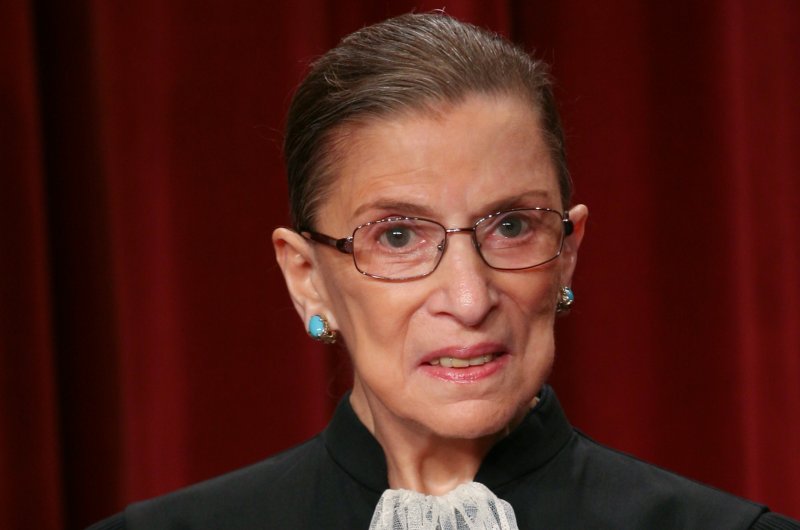Supreme Court Justice Ruth Bader Ginsburg wrote the dissenting opinion on the decision to let Texas' controversial voter ID law stand, joined by Justices Sonia Sotomayer and Elena Kagan. (File/UPI/Gary Fabiano/Pool) |
License Photo
WASHINGTON, Oct. 18 (UPI) -- The Supreme Court decided Saturday Texas can enforce its controversial voter identification law in the upcoming election, early voting for which begins Monday.
U.S. District Judge Nelva Gonzales Ramos ruled the law -- one of the most stringent such laws in the country -- unconstitutional on Oct. 9 on the grounds it functioned as a "poll tax" that would disenfranchise more than 600,000 voters, disproportionately black and Latino. The law was also found to place undue burden on elderly voters and poor voters.
The law, known as Senate Bill 14, approved seven forms of photo identification, including concealed handgun licenses but not college student IDs.
"The evidence establishes that discriminatory purpose was at least one of the motivating factors for the passage of SB 14," Ramos wrote in her decision.
The 5th U.S. Circuit Court of Appeals in New Orleans put that ruling on hold, however, on the grounds it was too close to Election Day to change the rules. The Justice Department and groups opposing the law issued an emergency request to stop Texas from enforcing the law.
The Supreme Court majority's order to allow the enforcement of SB 14 in the midterm election was unsigned, with a dissent written by Justice Ruth Bader Ginsburg and joined by Justices Sonia Sotomayor and Elena Kagan.
Ginsburg's six-page dissent noted the district court conducted a full trial that included expert testimony and statistical analyses, the findings of which were ignored by the Fifth Circuit.
"Senate Bill 14 may prevent more than 600,000 registered Texas voters (about 4.5% of all registered voters) from voting in person for lack of compliant identification. Id., at 50–51, 54. A sharply disproportionate percentage of those voters are African-American or Hispanic."
She went on to say "racial discrimination in elections in Texas is no mere historical artifact."
"To the contrary, Texas has been found in violation of the Voting Rights Act in every redistricting cycle from and after 1970. Op. 7. See, e.g., Texas v. United States, 887 F. Supp. 2d 133 (DC 2012) (Griffith, J.).
The District Court noted particularly plaintiffs' evidence -- largely unchallenged by Texas -- regarding the State's long history of official discrimination in voting, the statewide existence of racially polarized voting, the incidence of overtly racial political campaigns, the disproportionate lack of minority elected officials, and the failure of elected officials to respond to the concerns of minority voters."
Supporters of voter identification laws say they are necessary to prevent fraud, though there is scant evidence of in-person voter fraud. Saturday's decision marks the first time since 1982 the Supreme Court allowed the enforcement of a law restricting voting rights previously ruled unconstitutional by a federal court.















